The Devoted Warrior - An Introduction
Considering the Warrior Ethos and Pondering Biblical Principles for Applications to Modern Masculinity
An Introduction to the Devoted Warrior
This short-form essay series is intended to consider the warrior ethos, ponder Biblical principles, and consider how they each could be applied for men today.
Warriors
I am fascinated by the warriors from ancient (and modern) cultures around the world. I admire their unique combination of characteristics that make them renowned and legendary. The devotion to their leader and/or cause, the expertise and skill, the wisdom that comes with their vocation, a sense of calm and generosity during times of peace but a sense of urgency and intention in times of action.
This interest likely began during my childhood years, particularly because of a lot of the books, TV shows and movies my brother and I consumed. One of our favories was the Star Wars prequel trilogy which we watched over and over again on DVD. This world-renowned sci-fi universe featured the legendary warriors called the Jedi. While they were warriors wielding crystal-powered lightsabers and harnessing the power of “the Force”, they were also wise monks, teachers, explorers, and mediators. Of course, like any warriors they have their flaws, but their principles and portrayal through those films really inspired me.
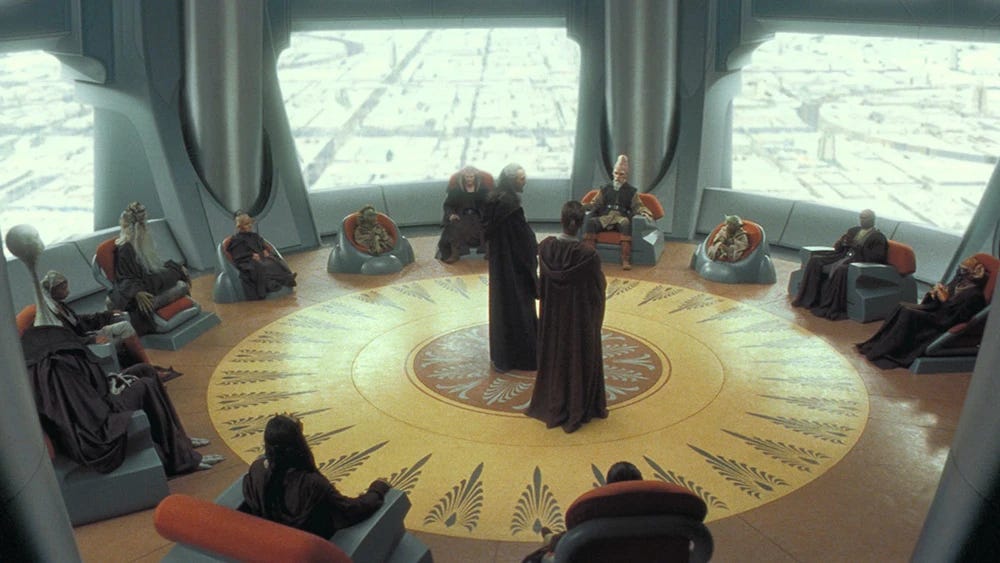
The famous Jedi Master Yoda was one of my favorites because although his small stature and apparent old age seemed like weakness to some, he was one of the highest ranking and renowned Jedi of their order due to his unparalleled wisdom and surprising skills in combat. His battle against Count Dooku in Episode II was one of my favorite moments, putting his agility and strength on full display.
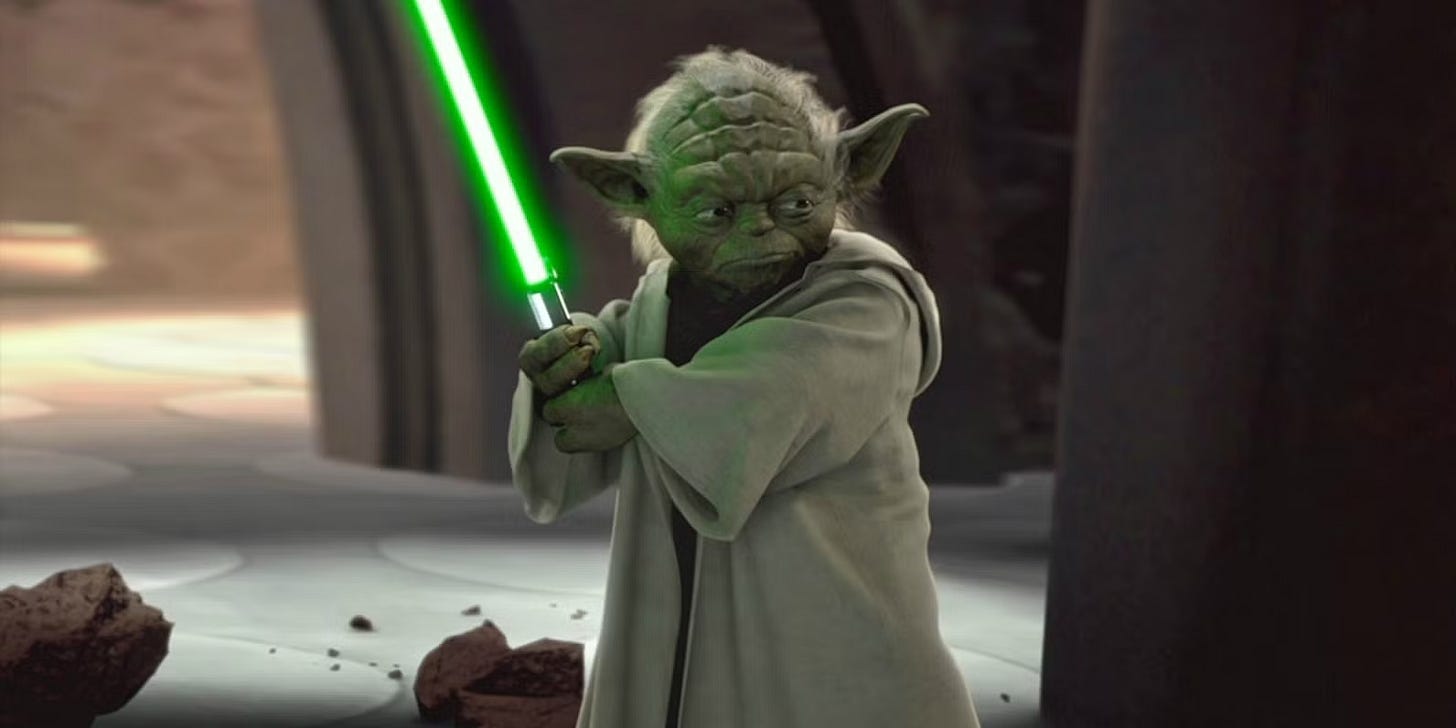
My brother and I would watch the movies over and over again marveling at these Jedi as they engaged in strategic battles of wit, meditated on big decisions, trained with diligence, worked together as a team and of course wielded their lightsabers with grace and power in epic battles when the need arose. We would pick up sticks from wherever we could find them to pretend “duel” with our makeshift lightsabers, eventually graduating to plastic retractable ones for us to wield in combat.
These fictional Jedi created by George Lucas were inspired by a variety of eastern religions1 and Judaism2 as well as a variety of non-fiction warriors3 including the Knights Templar, Japanese samurai, and Shaolin monks.
There are plenty of other examples of real-life warriors that embody some of these admirable characteristics including maasai warriors (Africa), Roman soldiers (Europe / Middle East) and knights (Europe). These characteristics and selfless motivations are also possessed by superheroes like Superman, Batman, and Spiderman. All together, this idea of a noble, mighty warrior has helped shape my perspective on life because I seek to emulate some of their characteristics in my own life.
Are Men Warriors Today?
As I consider the admirable characteristics of these warriors, I have found myself wondering where I find them today in men of the 21st century.
Positive Examples
I see positive examples of these qualities of warriors on display in a handful of men. Bryan Stevenson, the late Jimmy Carter, and Tim Tebow are a few men who have left a meaningful positive impact on the world through their pursuit of justice and generosity, living with integrity and character.
Stevenson has fought for the rights of individuals who were wrongly convicted and victims of racial injustice, literally saving lives from death row as a lawyer. Carter led international peace and humanitarian efforts as president of the US and helped build 4,447 homes for families in need through his 90’s. And Tebow has leveraged his celebrity platform he found in sports to serve victims of human trafficking and exploitation, orphans, those with profound medical needs, and those with special needs.
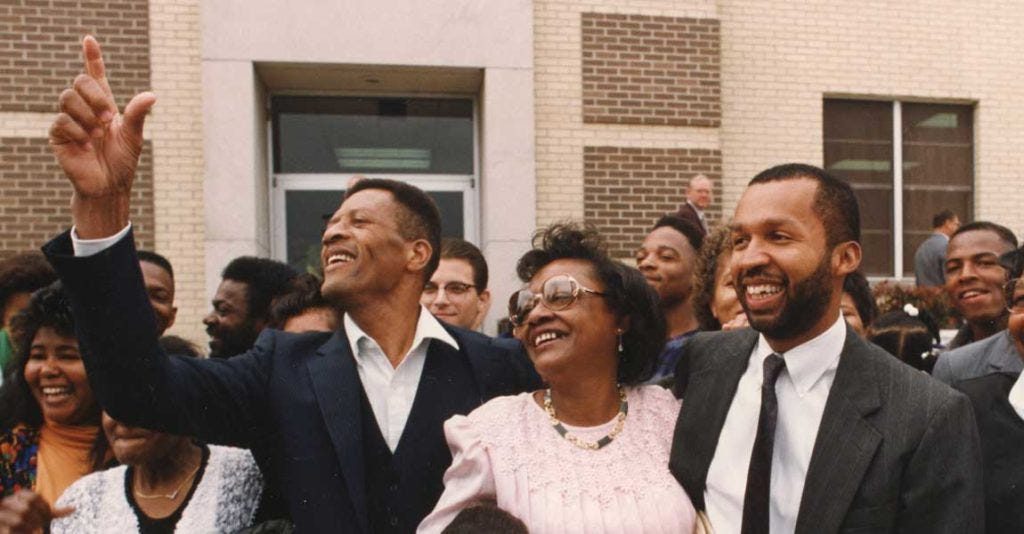
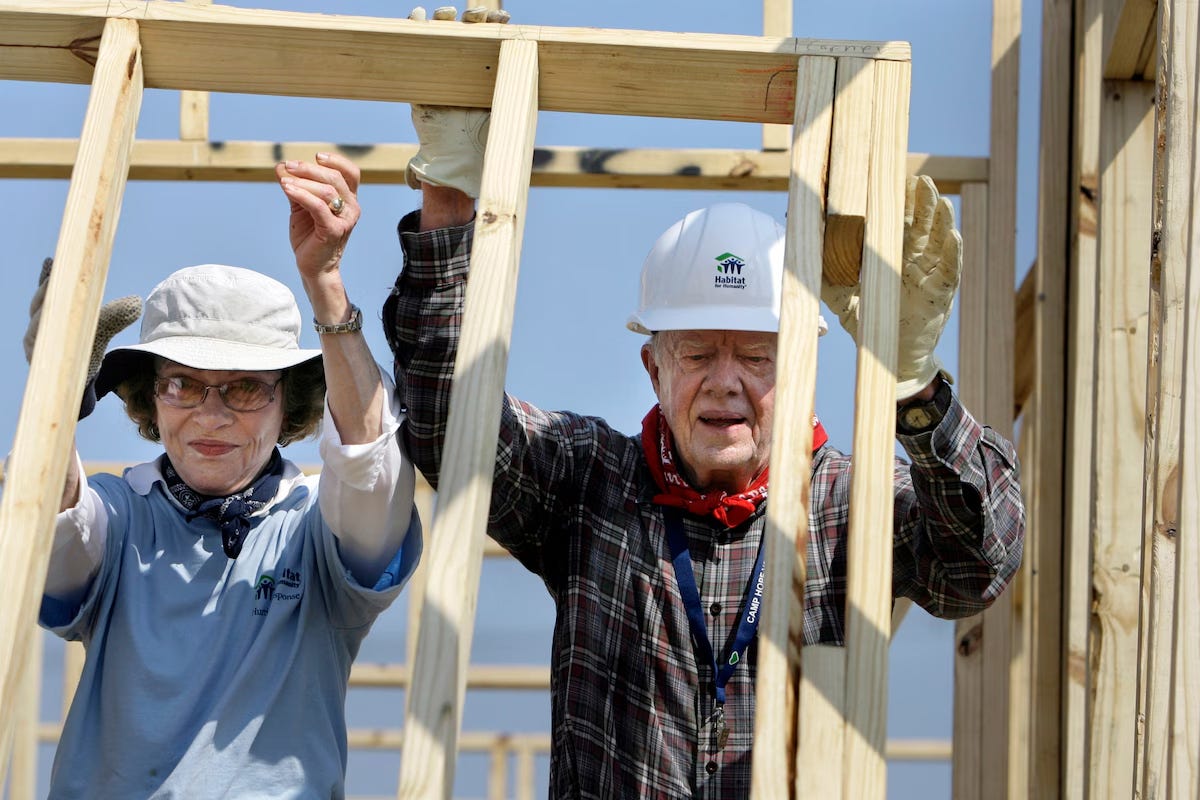
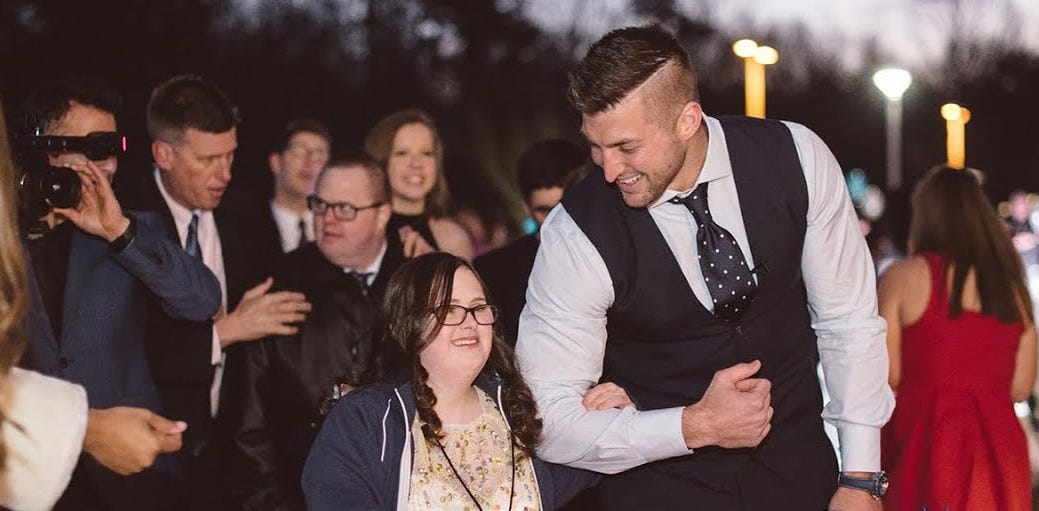
These are not just “good” men, doing just enough to get by, acting morally simply for the sake of courtesy. I would argue that they are devoted warriors, fighting for something greater than themselves with passion, confidence and intention. Of course these men have their flaws like any other human being, but they are generally recognized for how they have used their skills and positions for the greater good.
I have also personally witnessed my fair share of admirable men in my life including my father, mentors and spiritual leaders. I’m sure you may also have some personal experience or at least have heard stories of men living lives full of diligence, responsibility, compassion, excellence, and wisdom.
However, I find that the wider societal perspective on men is not particularly favorable. Headlines and stereotypes of the day demonstrate how many men today struggle to embody the admirable qualities of warriors. The source of that struggle is worth delving into further (whether due to societal pressures, personal challenges, lack of strong role models, etc.), but for now I’d like to consider these shortcomings and whether there might be ways to overcome them.
Alpha Males
Men in our modern American culture are often criticized for their possession of the cursed characteristics of “toxic masculinity”:
“a set of attitudes and ways of behaving stereotypically associated with or expected of men, regarded as having a negative impact on men and on society as a whole.”4
These attitudes and ways of behaving include but are not limited to misogyny, lust, greed, pride, selfish ambition, overconfidence, aggression… and the list goes on.
While the term “Alpha Male” can be viewed as a positive one, describing a leader who is strong and confident, I find that it is often used in a derogatory sense to capture these toxic traits and men who try to mask their insecurities by feigning confidence and authority.

You don’t have to look far to find the failures of these kinds of men called out in the news, from violence5 to sexual perversion to greed to power brokering. Andrew Tate seems to be the poster child for the toxic Alpha Males, with plenty of recent scrutiny for the negative impact he’s had on individuals, society and himself.
I consider this phenomenon to be an overemphasis on the confidence, motivation and strength that comes with being a warrior, a distortion of those good traits.
Beta Males
Then there are “Beta Males”. The yin to Alpha Males’ yang. These men are also known as the “nice guys” (as illustrated in this classic depiction by Ryan Higa during YouTube’s prime) or “simps”, “lost boys”, “man child”, “drifters”, or “basement dwellers”. The men that match these stereotypes generally fit into the broader category of Beta Males who might be kind individuals, but are also characterized by being passive, uninspired, soft, and lacking motivation.

I have personally observed and been told by women (including my wife and her friends) that many men suffer from a lack of motivation to take risks out in the real world, putting their neck on the line for something they believe in, resulting in uninteresting and unattractive men. For some guys, the biggest passion they have is their fandom for a sports team where it doesn’t take any guts to get the glory.
These Beta Males seem to overemphasize the humility and kindness that comes with being a warrior at the expense of having sufficient drive and conviction, another kind of distortion of their traits.
A Christian Perspective
As a Christian, I’ve seen both ends of this spectrum among other men who profess their faith. While there are certainly some who could be considered Alpha Males, I see most Christian men turn out to be Beta Males. The common pattern seems to be the rejection of clear outward sins of “toxic” masculinity, but inadvertently steering so clear from that perversion of masculinity that the strict adherence to distorted rules of Christian living ultimately sterilizes men, robbing life of its depth, joy and sense of purpose.
This pattern was the primary reason why many of my peers in college would reject the idea of Christianity, seeing it only as a list of do’s and dont’s that governs their lives. Not only would this “religion” cause them to give up their current lifestyle and forfeit all the fun that comes with being in a college town, but they would have to devolve into this lame, vanilla nice guy with seemingly little motivation to do any more than the bare minimum to just get by. To be fair, if that was truly the alternative, I don’t blame them for being easily disinterested with this idea of Christianity.
Of course this negative perception of the fate of Christian men may not be true, but are there enough men who break this mold to change the narrative? If you had to ask me, I would say the answer is no…
The Way of the Devoted Warrior
Now you may be asking: what does this fascination with warriors have to do with modern men?
Well, when I consider the call of Christians - the mission that is laid out for those who profess faith in Jesus Christ - I feel like the appropriate response should align much more with the admirable characteristics of the warrior than either the Alpha or Beta Males. Christ’s call to action sets the bar very high: wisdom, righteousness, and self-sacrifice for the good of others. These attributes should be an outer representation of a deep inner transformation of humility and devotion.
I acknowledge that people have different values, self-directed purposes of their lives, and definitions of what it means to be a man. But I believe that there are some universal truths about life, and that the Bible has something to offer when it comes to ideas about positive masculinity. Jesus as a model and teacher presents a refreshing alternative way of living that is both personally fulfilling and offers significant value to society with potential eternal ramifications.
This way is not just being a “good” man. This is the way of a devoted warrior. Hence the name of this blog.
Therefore, the primary purpose of this blog is to seek to answer these two questions:
How can men, no matter their purpose in life or object of devotion, be modern warriors by considering the implications of living out principles espoused in the Bible?
How can Christian men, those who are devoted to Jesus Christ, be modern warriors living out the mission set out for us by our Lord with an eternal impact?
I will share my research on examples of warriors, dive deeper into the current state of men, consider what the Bible has to say about purposeful living in a wide variety of different areas of life, and ask questions to challenge readers to consider their response. I personally believe that there is much to be learned from these scriptures and the teachings of Christ that can make better men, a better society, and a better world. We are in desperate need of all three.
My goal is not to prescribe how men should act, but simply offer perspectives on how men could act in order to broaden their understanding and enable them to take steps to live better, more intentional lives.
Why Now?
I’ve been journaling, taking notes, and conducting research since 2018 with the intentions of writing a book on this subject. The idea has evolved over time and I have drifted in and out of investing energy into it through different seasons of life. But I am now eager to put these ideas and findings into short-form essays in order to produce content in bite-sized chunks and iterate over time. I feel personally convicted to pursue this project right now for the benefit of other men for myself, but I also think our current moment in history could really use this conversation.
From a broader cultural perspective, men are struggling with loneliness and disproportionately affected by suicide. Boys have fallen behind in academics (arguably due to a constrained education system for them). Men in leadership seem to be criticized much more often than they are praised. There seems to be a broader perspective (especially from women) that there are few eligible bachelors, and those that are out there are often afraid to approach or pursue eligible women. And there is ongoing conversation about what it means to be a man, especially considering the growing size and significance of the LGBTQ+ community.
Christianity also seems to be growing in significance in our society. Bible sales are increasing. Critical intellectual conversations about Christianity are happening with the likes of Joe Rogan (through Wes Huff), Alex O'Connor, Jordan Peterson, among many others. And this past presidential election has re-energized the debate on the polarizing concept of Christian nationalism6 and what relevance the religion has on the United States of America7 .
While I may not be an expert, I hope to contribute something of value in this space and make a meaningful impact. Although I have aspirations to make that impact significant, I would still consider this blog a success if even just one person feels that they have made a change in their life for the better as a result of my work.
How can you participate in this journey? Please follow this blog, not just reading the content but engaging in dialogue about these topics - I really do want to hear what others think in order for me to learn and improve my perspectives and ultimately the content I share. And please consider these questions and experiment applying the principles I present in your own life in order to see if we can become the best version of ourselves - not just “good” men but devoted warriors.
Wetmore Jr., Kevin J. (2005). The Empire Triumphant: Race, Religion, and Rebellion in the Star Wars Films. Jefferson, MI: McFarland & Company.
Rinzler, J.W. The Making of Star Wars: The Definitive Story Behind the Original Film
Kaminski, Michael. The Secret History of Star Wars
"The Mythology of Star Wars with George Lucas and Bill Moyers". films.com. Films Media Group. Archived from the original on 3 January 2010. Retrieved 26 February 2015.
"Star Wars @ NASM, Unit 1, Introduction Page". Nasm.si.edu. 31 January 1999. Archived from the original on 8 April 2010. Retrieved 22 January 2010.
Jamilla, Nick. Sword Fighting in the Star Wars Universe: Historical Origins, Style and Philosophy. McFarland & Company, Inc., Publishers, 2012.
Oxford English Dictionary
Men, for instance, accounted for 79% of perceived offenders in violent incidents, compared with 49% of the nation’s 12-and-older population that year. [Pew Research]
https://findanexpert.unimelb.edu.au/news/16315-men-are-more-likely-to-commit-violent-crimes.-why-is-this-so-and-how-do-we-change-it%3F
https://www.britannica.com/topic/Christian-nationalism
While the high-profile conversations surrounding Christian Nationalism are another marker of the prevalence of Christianity in society, I will generally be steering clear of politics for my content




